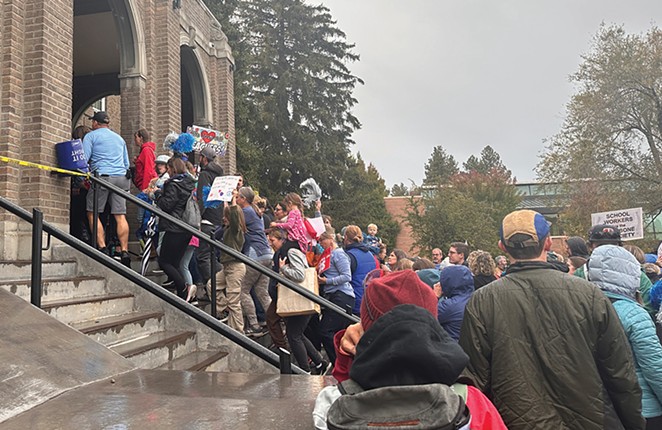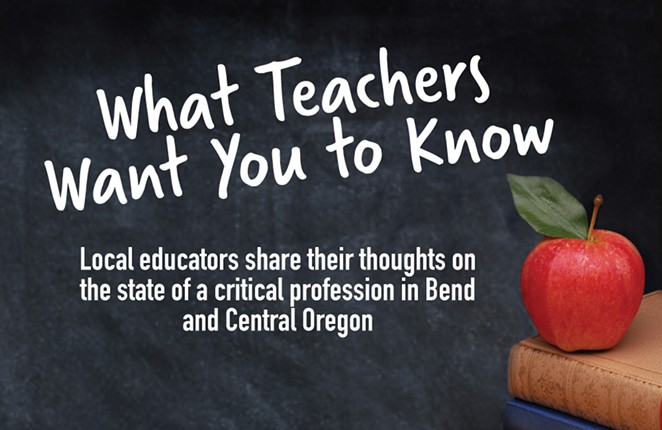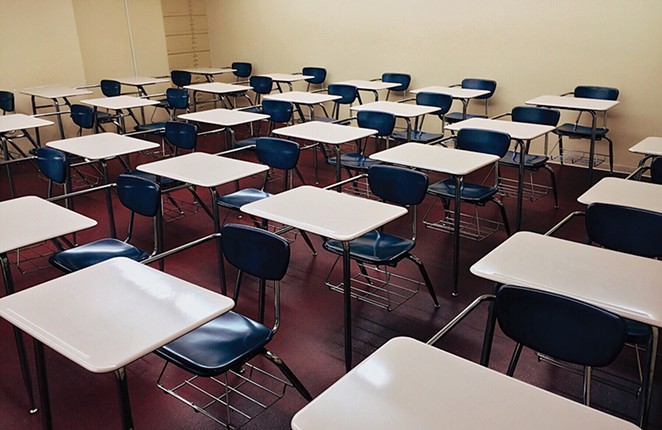Recent rounds of union bargaining in Oregon have shined a spotlight onto issues educators deal with in their day-to-day lives. For over three weeks in November 2023, Portland Public Schools teachers embarked on an unprecedented strike in an effort to come to an agreement with the PPS district.
On Nov. 26, the district and the union representing teachers, counselors and other school employees reached a tentative deal. The three-year, $175 million contract agreement included cost-of-living increases for teachers, the creation of new committees to govern class sizes and increased planning time for educators, according to reporting from Oregon Public Broadcasting.
Meanwhile, local teachers were fighting for a new contract all the while.
Bend-La Pine Schools and the Bend Education Association, the teacher's union for BLPS, reached a tentative contract agreement on Jan. 30 after bargaining since May 30, 2023. BLPS certified staff had been working without a contract since it expired on June 30. The contract was ratified by union members on Saturday, Feb. 10. The school board was slated to vote on the contract on Feb. 13.
"I think the agreement is solid," said BEA president Sarah Barclay. "I believe it takes into account many priorities that members had brought forward." According to Barclay, the agreement made major improvements to more than 20 articles, which was nearly the entire contract.
"This agreement is the result of lengthy and deep discussions with certified employees in our district on issues that matter both to them and to us," said Superintendent Steve Cook in a press release.
While a contract has been ratified, the job of being a teacher is not easy, and is constantly growing and changing.
Over the years, the duties, responsibilities and class sizes have grown exponentially, making it so that teachers today are tasked with being so much more than just classroom teachers. More work, coupled with fewer resources, has caused a major strain on educators trying their hardest to do the critical jobs they are passionate about.
For their new contract, educators asked for a fair cost of living adjustment, manageable class sizes and workloads, and safety and behavior protocols.
One item requested in the BLPS contract was more planning time. While most people are aware of the hard work teachers put into lessons and the time it takes to grade each student's work, most don't realize the amount of time and energy educators are putting in outside of work hours, without getting paid.
Outside of work
"The education system is built upon free labor," said a BLPS teacher who chose not to be named out of fear of retaliation. Teachers are often forced to work outside of work hours to do their jobs effectively.
On top of the time it takes to plan engaging lessons and assess students' work, teachers also have to communicate with families and students, clean and organize their spaces, acquire supplies, enter behavioral data, serve on school improvement committees, and more. According to that unnamed teacher, the list of extra duties far exceeds the prep time teachers are provided.
"Teaching is no longer just teaching students about the curriculum," said BLPS teacher Heather Faast. Teaching, for her, has changed drastically in the last 20 years, with growing responsibilities and duties.
The pace of the daily teaching schedule makes it nearly impossible for teachers to get extra work done during contract hours.
"The running joke is you realize you have to pee at the end of first period. Then, lunch comes around and you realize, 'oh I still haven't gone to the bathroom,'" said James Williams, a BLPS teacher. "You're on from the time you walk in this building."
Faast wishes teachers had more help, and more prep time inside working hours. "Teaching is not a '9 to 5' type of job," she said. The amount of work teachers are doing at home has been exacerbated by increasingly large class sizes.
Ruth Fox has been a middle school teacher in Bend for 16 years. Over the years, she's witnessed how the growing class sizes have drastically changed the pace and the amount of work that teachers must do.
"Over those years, the trend for what is being asked of us has been to do more with less," she said. The class size cap for schools used to hover around 25 students per class, said Fox. Today, teachers have 30 to 35 students in each class.
Most of Williams' classes contain over 30 students. He strives to give them thoughtful and personalized feedback, he said, which can take him up to 10-12 extra hours per week outside of the classroom for just one assignment.
"It's hard not to feel like it's an insurmountable task, because of the sheer number of students that they pile into your class and the responsibilities that are ever growing," he said.
With more resources and funding, teachers could have smaller class sizes, helping students get the attention, feedback and care they need to learn. The difference between a class of 23 versus 33, Williams said, makes a huge difference.
Class size is not addressed in the contract, said Barclay.
"We want to do a good job; that's why it's so frustrating," said Williams. "We feel like we often can't. We know we can do a better job for the students."

Classroom changes
Since the pandemic, teachers have noticed a change in classrooms, seeing kids with behavior problems struggling to focus. "As educators, we have to meet our kids where they are at, and that changes from year to year," said an anonymous BLPS teacher.
Some students, she said, are checked out and avoiding classwork; some are causing major disruptions and others are struggling to focus and learn because of other kids around them. According to Fox, students are also struggling with mental health issues in higher numbers. Many often try to blame these increasing behaviors on the pandemic, but Fox sees it as more of a systemic issue.
Teachers know the importance of students' mental health, but they often don't have the capacity to provide what kids need. One teacher outside of the BLPS district, who wishes to be anonymous, has also noticed changes in recent years, seeing just how much the responsibilities have fallen on teachers.
"If you graduated any time before 2019, teachers were mostly just teachers," she said. Historically, every teacher has had unspoken job descriptions with extra responsibilities, she noted. However, the pandemic has only added more onto their plates.
"Those responsibilities have morphed in the past few years from unwritten job descriptions to implied, demanded, and all but required expectation," she said. "Teachers now are instructors, therapists, interventionists, parent mediators, conflict managers, guardians and so much more," said the anonymous teacher.
Teachers have been speaking up about this issue, and are hoping to be heard, according to Fox. Schools don't have enough mental health and behavior support staff to address these needs, so it falls on the teachers' backs. "This trend towards doing more with less is leading to teacher burnout," said Fox.
The ratified contract will move forward with an article including learning environment provisions, allowing educators to make decisions about prioritizing safety and making sure that students who are dysregulated or need a different space for the time being are able to get what they need, while everyone else in the classroom is able to continue learning, according to Barclay of BEA.
Retaining and gaining educators
The growing duties and the pressure that goes along with them have led many teachers to a breaking point. The lack of resources, and staff, to help students struggling with issues is causing teachers to leave the field.
The amount of turnover Fox has seen in recent years, she said, is staggering. Williams has seen his school lose a number of great teachers in recent years, too.
"Teachers I really looked up to and were really damn good at their jobs...they finally said, 'I can't do this anymore.' That, I think, is very telling," Williams said. He worries about the next generation of teachers and how they will fare with the current system.
The trend of losing teachers is not new today. Schools all around the country are suffering with the loss of great teachers. A 2022 survey, conducted by the National Education Association, found that 55% of educators said they were thinking about leaving the profession.
"We need funding to be able to recruit and to retain teachers, and we need a robust system of mentors that are given the time and space to help new teachers," said Fox.
Most teachers would agree that funding is at the root of a lot of major problems in the field. "We need more money. Yes, from the district, but they need more money from the state," Williams said. "If we zoom out further, America as a country needs to get to a place where it takes education more seriously."
After the Portland Public Schools strike ended in late November, Gov. Tina Kotek said she planned to spearhead a statewide conversation over how to address the challenges in the state's public school system. With this, Kotek said it was time to take a "deep dive" on how the state funds schools and review the methodology, according to reporting from OPB.
The ratified BLPS teacher contract added a cost of living adjustment, which is 6.2% in year one. "This is a good start," said Barclay. "It's not the end of the conversation on that topic." The bargaining teams agreed to reopen discussions in spring 2025 to negotiate salary and insurance cap adjustments, according to a BLPS press release.
An anonymous BLPS teacher said she has put a lot of time and money into this profession but is not sure if she will continue. "I used to think teaching was a career that would take me all the way to retirement. Right now, I do not see myself retiring as a teacher, and that is devastating to me."
Another anonymous teacher, outside of the BLPS district, has been in the field for less than five years. She loves her job, her students and her school, but often feels discouraged by the current system. "Education is a wonderful field to enter, but an impossible one to stay in," she said.
Fox, the middle school teacher, remains passionate about teaching, but sees the need for continued community help and support. She hopes the community will come together to help solve the most pressing issues in our schools.
Hope for the future
While many educators share the feeling of being discouraged and overwhelmed, their passion for teaching students, as well as their hope for change, keeps them in the field.
The only hope one BLPS teacher has left, she said, is that the efforts on both sides of the bargaining table will lead to the ratification of a better contract. "The kids in our community deserve amazing teachers, and our contract is the foundation of the recruitment and retention of quality staff for our schools," she said.
She sees the contract as a way that educating the community can continue in a more positive direction. "Overhauling the contract took an incredible amount of work, but it will allow the district to get back to what it used to be — a desirable place to work," she said.
Statewide bargaining attention has highlighted major problems in today's education system, which Fox finds encouraging. "These dedicated educators have been sharing stories, speaking up, and asking and demanding what they need," said Fox. "I think that some of the noise that is being made both here and elsewhere in the state is doing an excellent job of highlighting the needs that our schools are facing, and I am hopeful that we have folks at the state level that hear us, and in our community that hear us."
Through the bargaining, teachers have also noticed an overwhelming amount of support from people. "It is humbling to know the community does value educators and that hope is keeping me afloat," said a BLPS teacher.
Teacher Williams shared his appreciation, not only for the community support he has experienced, but the educators who continue to do the hard work for their students. "We have really good teachers throughout BLP. Impressively good, especially considering how heavily the deck is stacked against them," he said. "You're psyched if your kid is in this district."
As much as teachers like Ruth Fox are disheartened to see the issues they are constantly facing, the passion they hold for this profession, and for their students, pushes them to carry on.
"I love and care about my students. I still go to work and they make me smile and laugh every day. There is a lot of fun in our jobs and I feel it is a privilege and an honor to be trusted to educate these young people," said Fox. "The frustration and desire to make change truly comes out of wanting what is best for the students and what they deserve."
























